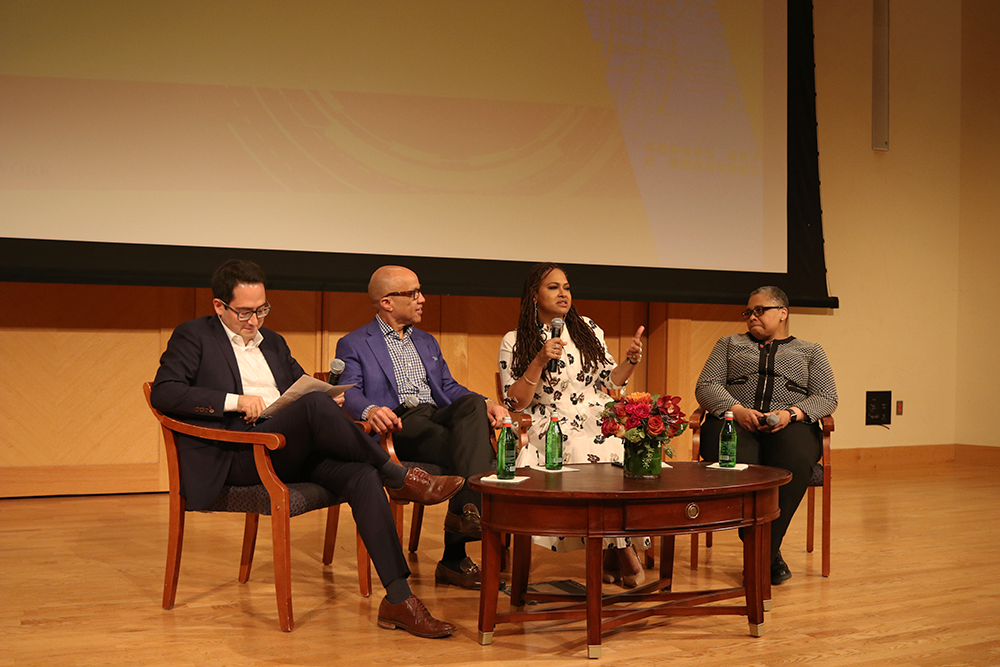Technological development should focus on promoting the public interest, panelists said during the inaugural gathering of the Public Interest Technology University Network in the Rafik B. Hariri Building on Monday.
Georgetown is one of the founding members of PIT-UN, a partnership among 21 colleges and universities. The network aims to develop the field of public interest technology, which focuses on how innovative technology interacts with government policy. The PIT-UN supports technologists and policy leaders who will shape the field of public interest technology in the future through its various programs.
The event was composed of several panels featuring filmmaker Ava DuVernay, Ford Foundation President Darren Walker and other leaders in higher education, philanthropic and public policy communities.
Sharing stories with each other can contribute to a more inclusive environment in the field of technology, according to DuVernay, who spoke at the first panel, “Technology, Race, and Our Future.”
“We’re all storytellers; everyone will walk out of this space and talk about what happened here to tell the story about what they learned,” DuVernay said. “We need to create more forums like this, more opportunities to share with each other.”

Using technology for good means advancing the public interest, not the ideas of good and evil that have been appropriated and turned into brands, according to Walker, who spoke on the panel with DuVernay.
“We have been very unwavering in our idea that this must be rooted in the notion of a public interest,” Walker said. “The idea of the public interest is a space where the private interests and our interests intersect, and that is often a contested space.”
Since PIT-UN’s launch in March 2019, universities in the network have developed degrees, programs and new initiatives to support leaders pursuing technology careers with an emphasis on the public good, according to the network’s website. Georgetown launched the Tech & Society Initiative, which seeks to develop new courses that consider the intersection of technology and the topics of ethics and governance.
The event also included panelists from the Federal Trade Commission and the Federal Communications Commission, two regulatory government agencies that seek to protect consumers and promote growth in the technology sector in addition to enforcing antitrust laws and regulating interstate communications.
The intersection of public policy and technology is more important now than ever to solve societal problems, according to University Provost Robert Groves, who introduced the first panel.
“We see in our lives a rate of technological change that is unprecedented and we want to use it to impact society exponentially,” Groves said. “We envisioned intentional development to use technology to solve pressing problems of the world.”
Two Georgetown faculty teams were announced at the conference as PIT-UN grant recipients out of a total of 27 grants awarded nationally through the organization. The network supports the development of new public interest technology initiatives and institutions in academia through its PIT-UN Challenge Fund.
Georgetown College professor Maggie Little and founding director of the Center for Security and Emerging Technology Jason Matheny were awarded $85,991 from the Challenge Fund for their proposal as a team to study the integration of ethics in the context of the governance of artificial intelligence.
Alexandra Givens, executive director of the Institute for Technology Law and Policy and Paul Ohm, faculty director of the Georgetown Center on Privacy & Technology, were awarded $36,000 as a team for their proposal to strengthen cross-disciplinary research of computer science and law.
Universities can do more to develop the field of public interest technology by incentivizing interdisciplinary studies, according to Walker.
“Universities are always at the center of transformation, and certainly in this country have been, and we won’t solve this without having universities change their behavior,” Walker said. “What we at the foundation can do is help to provide the catalyzing feed resources to pilot and test some of these ideas and to partner with the public and private sector.”
The promotion of the public interest seeks to ensure the protection of the most vulnerable in society, Walker said.
“We need today in our new digital world to articulate and defend and protect the idea of the public interest in a digital world,” Walker said. “Unfortunately that public interest has been defined primarily by private interests and corporate interests.”




















